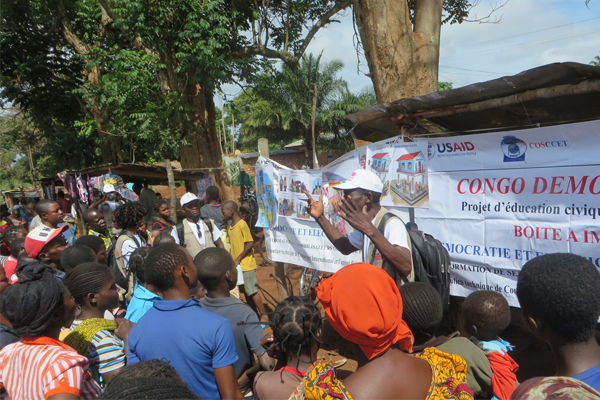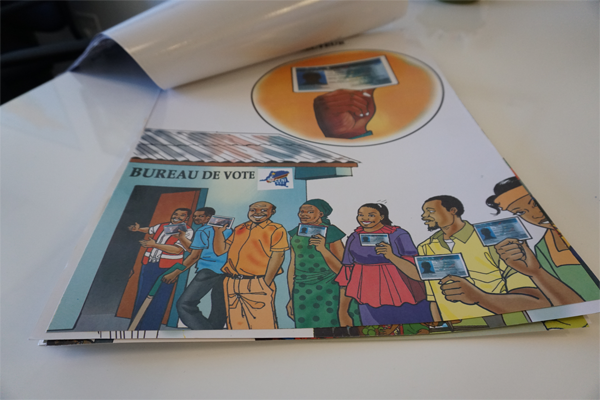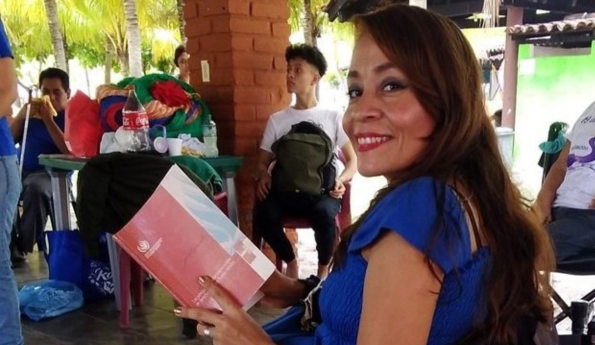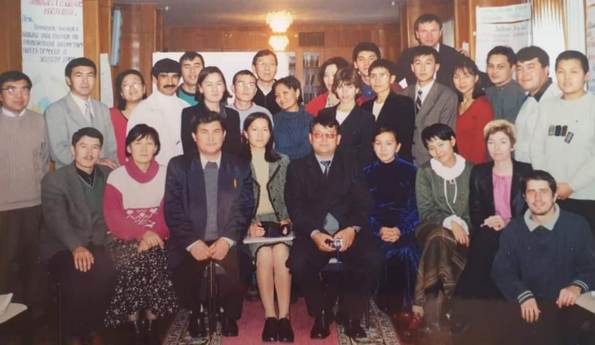In the Democratic Republic of the Congo (DRC), Counterpart’s Congo Demokrasia team has been working with local organizations to support citizen engagement in the upcoming December 2017 elections. Our team has been using a train-the-trainer model for voter educators to help make sure that all Congolese over the age of 18 know how to register and vote and why civic participation matters.
Counterpart’s partner COSCCET recently deployed five voter educators in the territory of Kasenga, in the Haut-Katanga Province, as part of a series of voter education community events. The forums brought together 183 participants, including 98 women. The events took the form of boite à images sessions, meaning a “box of images.” These sessions are a common practice in the DRC and throughout Africa. Facilitators teach concepts – in this case, voter rights and democracy – to an audience using a series of images to visually portray key messages. Conveying information in this way has proven to be very successful in rural, often illiterate, communities.
During one of these boite à images sessions facilitated by COSCCET in November 2016, the lead voter educator asked the attendees if any of them had lost their old voter ID card, one of the documents required to obtain a new card and be eligible to vote in the elections. Unfortunately, many of the participants reported lost cards, and worse, were unsure of how to obtain a new one. This problem was exacerbated by how cost-prohibitive getting a certification of a lost card was for many attendees – essentially meaning that many community members could not afford to vote in the upcoming elections. In the DRC, a lost card certification costs 5000 Fc (almost $5), and citizens are required to go through a confusing and lengthy process to be receive a new card.
When the voter educators heard these stories, they realized that the cost of a replacement was much too high for this community where the average income is only two dollars a day, and they decided that something needed to be done. Bringing with them a few community representatives to tell their stories, they headed to the Office of the Territory where they met with local authorities. Together, they explained how important it was to allow communities like Kasenga to be able to participate freely in the elections and to be able to acquire necessary documents like the replacement voter cards with minimal administrative burden and at a more reasonable cost.
Committed to ensuring widespread civic engagement, the Territory Administrator, Mr. Celestin Kanyembo, made a decision to drop the fee from 5000 Fc to 2000 Fc (less than $2). By working together and listening to the concerns of the local community, COSCCET and the local government made a real change in the lives of the citizens of Kasenga, by removing a barrier to voting. This will help ensure more citizens who will be able to exercise their right to vote and have their voices heard in the upcoming elections in DRC.
This blog post was made possible by the generous support of the American peoples through the United States Agency for International Development (USAID) and the British people through the Department for International Development (UKAID) under Cooperative Agreement No. AID-660-LA-15-00002. The opinions expressed herein are those of the author(s) and do not necessarily reflect the views of USAID/USG or UKAID/UKG.






